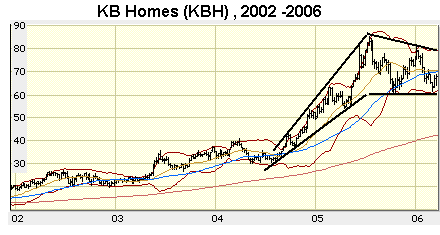

|
| weblog/wEssays | home | ||||||||||||||||||||||||||||||||||||||||
|
The Five Stages of a Housing Bubble (March 29, 2006) March 29, 2006  Psychologist Elizabeth Kubler-Ross suggested the process of grieving has five distinct
stages. In a somewhat analogous
fashion, participants in the housing bubble will pass through five emotional
stages: euphoria, doubt, denial, disillusion, realism.
Psychologist Elizabeth Kubler-Ross suggested the process of grieving has five distinct
stages. In a somewhat analogous
fashion, participants in the housing bubble will pass through five emotional
stages: euphoria, doubt, denial, disillusion, realism.
Kubler-Ross's five stages were: denial, anger, bargaining, depression, and acceptance. As people grieve the losses of their paper profits, or more tragically, the loss of their homes or entire equity, they may well pass through these very human feelings along the way. My list is somewhat different, as it starts with the essential emotional building-block of any bubble: euphoria. This is the sense of empowering glee as prices rise, seemingly inexorably, as the participants re-calculate their ever-rising wealth--and all without any application of labor! (Or recently, any deployment of capital, either.) This stage can be seen in the chart of KB Homes, a company which is a good proxy for the large residential builders. The euphoria is visible in the sharp rise of the stock price from mid-2004 to mid-2005. The decline (which I marked for emphasis) from this peak is the doubt/denial stages. As doubt about the housing bubble grows, the stock price falls. Then, as denial kicks in, the price recovers--but importantly, never to the previous high. This "lower highs, lower lows" is the classic stock market definition of a downtrend. A similar battle between doubt and denial plays out in the media every month when housing prices, inventory and sales figures are released. Every lower number spurs doubt, and every stabilizing number elicits denial: everything is OK, prices are stabilizing, etc. At some tipping point, denial gives way to full-blown disillusion. As declines in prices and sales and fast-rising inventories become inescapable trends, the flimsy walls of denial participants have constructed give way, and they become disillusioned with their real estate investments. Some decide to hang on, others decide to bail, and still more stop looking at the very real estate section they used to open first, when their net worth was rising by the month. As the declines continue unabated, year after year, participants finally make a realistic appraisal of the situation: housing was a bubble, and the deflation seemingly lasts forever. Investors give up and sell in disgust, banks give up the ghost and go bankrupt or sell their portfolios of non-performing mortgages for pennies on the dollar, and the ranks of working realtors thins to those few with connections to lenders, who are still dumping their foreclosed properties. When nobody in their right mind would consider buying real estate as an investment, the bottom will finally be reached. Unfortunately, all this takes a long time. That we are just in the very first stages of the decline are apparent in articles such as this one from The Wall Street Journal: Back To Reality, about the quickening slide in vacation home values. So who is still buying houses? It's hard to quantify, but here are my guesses: What appears to be lost on these folks--many of whom own six, ten or even more houses scattered around the country--is that they're simply exporting the bubble to areas which didn't have bubbles for a very good reason: permanent residents lack the big-bucks incomes needed to overpay for houses. While a house valued at $169,000 seems cheap to a Left or Right-Coast investor, when that house drops back to $80,000 in a few years, the loss suffered will be, percentage-wise, as unpalatable as losses suffered in "hot" areas. For examples of locales which are clearly toppy, skim this chart:
copyright © 2006 Charles Hugh Smith. All rights reserved in all media. I would be honored if you linked this wEssay to your site, or printed a copy for your own use. |
|||||||||||||||||||||||||||||||||||||||||
| weblog/wEssays | home | ||||||||||||||||||||||||||||||||||||||||